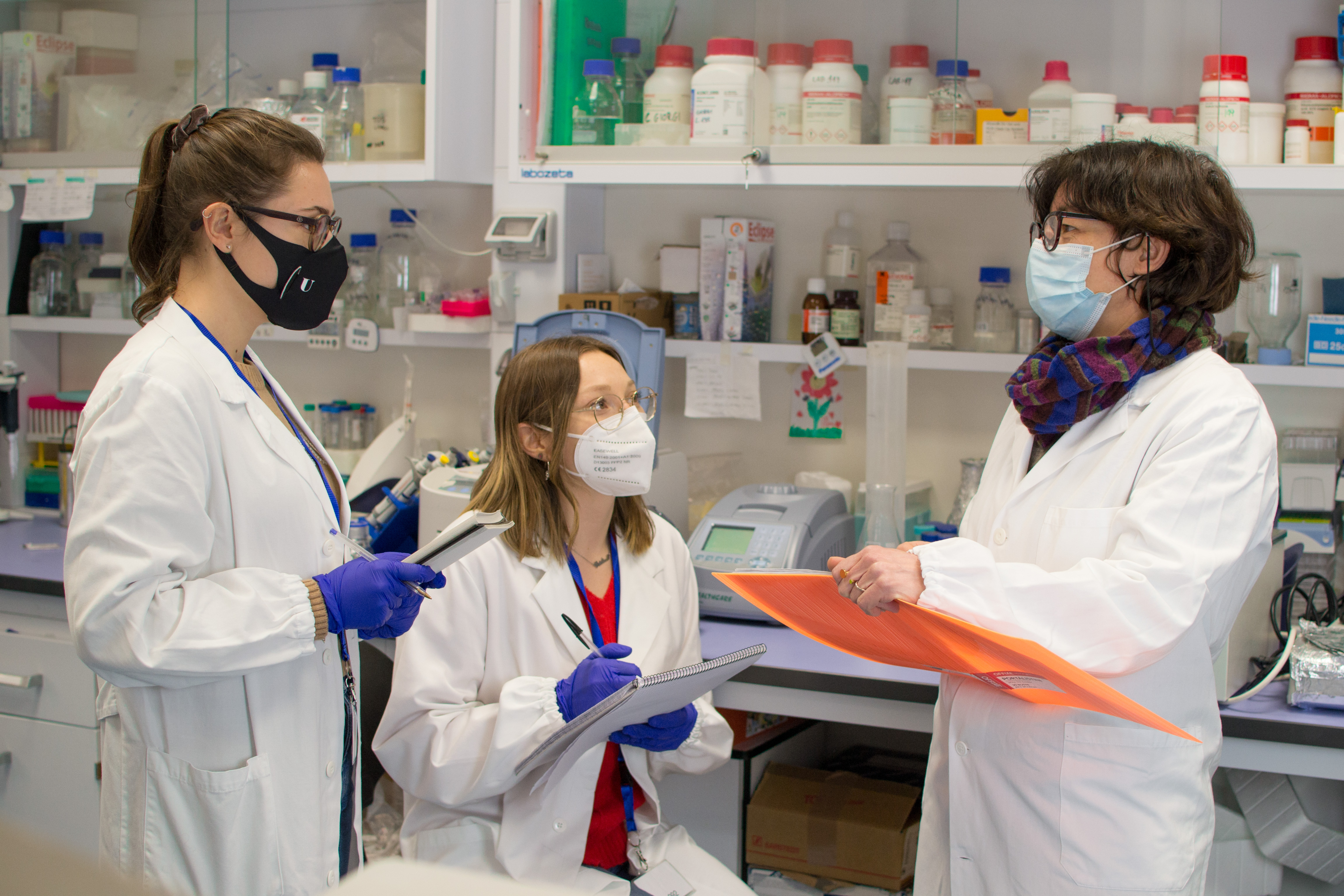Collaborations



Scuola Normale Superiore
EBRI has establish a strategic collaboration with the Scuola Normale Superiore, specifically with the Bio@SNS laboratory, directed by Antonino Cattaneo, on the following projects:
- i) Painless NGF: toward clinical applications in humans with Alzheimer’s disease;
- ii) Towards a new generation of analgesic drugs: epigenetic mechanisms in long-term analgesia induced by anti-TrkA and anti-NGF antibodies in chronic pain models;
- iii) proNGF: a novel biomarker for neurodegeneration in cerebrospinal fluid
- iv) scFv A13 antibody against Aβ oligomers in Alzheimer’s disease. Humanization of the recombinant A13 antibody and its use for gene therapy for Alzheimer’s disease.
- v) Recombinant antibody libraries and selection of intrabodies directed against post-translational modification of proteins (in collaboration with the intrabody group at Bio@SNS) .
Sapienza University of Roma (Department of Human Neuroscience)
EBRI and the Department of Human Neuroscience at the Sapienza University in Rome (Directed by Alfredo Berardelli) have established a joint research and diagnostics Laboratory in neurodegenerative diseases. EBRI researcher will be responsible for the analysis of validated biomarkers, as well as the identification of new biomarkers as potential diagnostic and therapeutic targets. The experimental activities will be integrated with the clinical research conducted at the Department of Neuroscience, in order to ensure a more accurate and early differential diagnosis with the perspective of a Precision Medicine.
Sapienza University of Roma, Department of Physiology and Pharmacology “Vittorio Erspamer”
EBRI collaborates with the Sapienza University Department of Physiology ad Pharmacology ‘Vittorio Erspamer’ on studies in the field of glia-neuron cell interactions in physiological and pathological conditions, and the neurobiological mechanisms underlying the interactions. From this scientific collaboration a PRIN research project was financed by MIUR on the role of microglia in the formation and expression of synaptic memory engrams.
Tecnomed Puglia
EBRI is a partner in the Tecnomed Puglia five-year project, in collaboration with the Centre for Neurodegenerative Diseases (University of Bari/Hospital Cardinale Panico Tricase), and the CNR Nanotec Institute in Lecce. In the framework of this project, an EBRI-CNR joint laboratory is projected at the Ecotekne Campus in Lecce, where new methods to measure diagnostic and prognostic biomarkers in neurodegenerative diseases will be developed, using antibody platforms (EBRI) and nanotechnologies (CNR Nanotec).
National Research Council (CNR)
EBRI has signed a Framework Agreement with the National Research Council (CNR) to promote and coordinate research projects in fields of mutual interest. In the framework of this agreement, EBRI collaborated in a strategic project entitled “Neurodegeneration, neuroinflammation and neurodevelopment: mechanisms and new therapies”.
Furthermore, EBRI collaborates with:
– Institute of Translational Pharmacology (CNR), Rome – with EBRI laboratory Tau protein, tauopathies, and Alzheimer’s disease (AD) and CoReLab SNS
– Institute of Neuroscience (CNR), Pisa – with EBRI Laboratory Cortical microcircuits and neurodevelopmental disorders
– Institute of molecular biology and pathology (CNR), Roma – with EBRI laboratories Messenger RNA metabolism of the nervous system and Regulations of neuronal excitability in physiological and pathological conditions
– Institute of Cell Biology and Neurobiology (CNR), Rome – with EBRI Genomics Facility
The Agostino Gemelli University Hospital IRCCS
In the framework of a scientific collaboration agreement, the Gemelli University Hospital and EBRI will carry out joint research activities preclinical and clinical studies relating to therapeutic applications of neurotrophic factors, i.e. nerve growth factor (NGF) in paediatric ophthalmic and neurological pathologies. In particular, research underway in therapeutic applications of painless NGF (an optimized protein of NGF, which does not cause pain) for the treatment of paediatric optical glioma, a benign brain tumour, which causes a gradual loss of vision due to the infiltration and compression of the optical paths by tumour cells.
These studies will allow us to understand the cellular and molecular mechanisms of the neuroprotective action of this molecule and to develop a new non-invasive pharmacological approach for halting the loss of visual function.
Neurological Institute Carlo Besta (Milan)
EBRI collaborates with the Neurological Institute Carlo Besta in Milano.
In the framework of this collaboration, EBRI participated in a network project that involved studies on patients with Alzheimer’s disease and with pre-Alzheimer’s progressive and developmental forms of dementia. The EBRI group developed strategies for novel biomarker analysis through the use of conformational anti-Aβ oligomers developed at EBRI, on biological samples from patients recruited by the clinical partners
G.B. Bietti Foundation (IRCCS)
EBRI has a research collaboration agreement with the G.B. Bietti Foundation, which carries out research activities for the prevention, early diagnosis and treatment (pharmacological and surgical) of ocular pathologies (glaucoma, diabetic retinopathy, pathologies of the optic nerve).
Istituto Superiore di Sanità
EBRI collaborates with the Italian Institute of Health (ISS) in various research projects in neuroscience, neurodegeneration, genomics, space medicine and artificial intelligence, applied to clinical data analysis.
EBRI-McGill University -Hebrew University
EBRI has established a trilateral collaboration agreement with McGill University and the Hebrew University of Jerusalem. The collaboration aims to: i) develop scientific collaborations to address topics such as neurodevelopmental disorders and neurodegenerative diseases and ii) promote exchange of knowledge and expertise, also via student exchange programmes.
In the framework of this trilateral collaboration, two joint symposiums have been held: the first in 2018 in Montreal on “Advancing Understanding of Nervous System Development, Function and Disease”; the second in 2019 in Rome on “Emerging concepts on synaptic dynamics and their dysfunction in neuronal disorders”.
